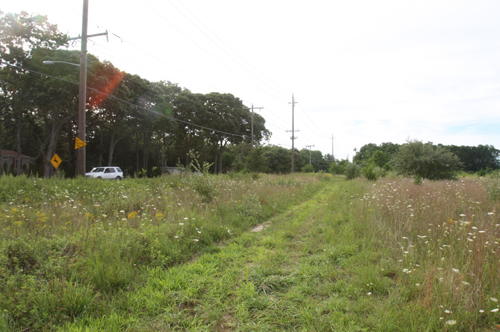Assisted living plan in doubt after Suffolk commission ruling

Concordia Senior Communities’ application for a zoning change to allow an assisted living center on Mill Road will need four votes of the Riverhead Town Board — instead of the customary three — to gain approval.
That’s because the Suffolk County Planning Commission last week rejected a county planning staff report supporting the property’s new zoning and voted instead to urge rejection of the zone change proposal, saying the property’s fertile farmland should be preserved, as opposed to an assisted living complex getting built.
The commission makes referrals on certain town projects or zoning proposals.
When it recommends denial, the Town Board can override that recommendation with a majority-plus-one vote.
It was still unclear this week if the Town Board would have the four votes needed in favor of overturning the county commission’s ruling, as Councilman George Gabrielsen said he’s inclined to agree with the county commission.
Council members Jim Wooten and Jodi Giglio both said they want more info on how the county commission arrived at its decision before they decide.
Councilman John Dunleavy has been pushing for the new zone for several years, saying it’s a needed use in Riverhead, and Supervisor Sean Walter said he supports the zone change.
Melville-based Concordia is proposing an “assisted living retirement community and generic continuing care retirement community” for 25 acres on the east side of Mill Road, south of Middle Road and north of Home Depot.
The proposal calls for 89 assisted living dwelling units and 100 independent dwelling units for a total square footage of 225,000.
But because existing zoning disallowed such a facility anywhere in Riverhead Town, the town had to create a whole new zoning category in order to make the project possible.
That process took more than three years, but the Town Board adopted the new zone, which is a floating zone that can be approved on any site that meets the criteria in the zone (called Residence-Retirement Community), in September.
Concordia, under the application name Genrac Associates, has since filed an application to have the floating zone placed on the 25 acres, which are currently zoned Agricultural Protection Zone, but the Town Board has yet to schedule a public hearing on that application, or to vote on the proposed zone change.
The planning commission voted 9 to 4 to reject the proposed zone change.
Riverhead’s representative, Carl Gabrielsen, the councilman’s brother, voted with the majority.
But Adrienne Esposito, acting chair of the commission, said numerous commission members, including herself, had concerns about the fact that the site is in an Agricultural Protection Zone and contained prime agriculture soils, even though it hasn’t been farmed in many years.
“We had a very lengthy and detailed discussion about the value of lost agricultural land in the county and concluded that the value of the agricultural land was greater than the need to site that facility there,” Ms. Esposito said in an interview. “That the facility could be located somwhere else in the town. It’s easier to move a facility than it is to move prime agricultural lands … It’s prime agricultural soils and they’re not making any more of that.”
Supervisor Sean Walter said he was “kind of stunned” by the commission vote but felt the board will have enough votes to override it.
“I would assume the whole board is supporting it because the whole board supported it during its creation,” he said. “This is something that’s been beaten to death for two years while I was supervisor and it was beaten to death when Phil [Cardinale] was supervisor before me.”
Councilman Gabrielsen, who runs a farm in Jamesport, said he’s been “uncomfortable” with the project since “day one.”
“Farmers are taking two shots here,” he said. “They’re diluting the [transfer of development rights] program and they’re using land in the APZ.”
The Long Island Farm Bureau also had expressed concern about the proposed zone’s impact on the TDR program because it allows greater densities using the floating zone than other projects that might purchase development rights and preserved farmland in order to build to a certain size.
“We need to look at the county recommendations and how they came up with them,” Ms. Giglio said. “This has got to be looked at more closely.”
Mr. Wooten said he wanted to read the planning commission’s findings and the minutes of their meeting before making a decision. He said it would be wrong to assume the board has four votes to override the county commission’s ruling.


